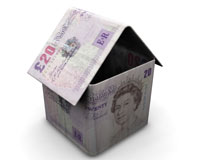Something surprising has been happening to the housing market in recent months. While most price measures have continued to roar away, activity indicators have been surprisingly weak. These contradictory indicators are likely to resolve themselves in the coming months.
The latest official house price index from the Office for National Statistics has prices nationally up by 11.7% on a year earlier, with London leading the way on 19.1%, and the South East up 12.2%. The Land Registry had a more modest 8.4% rise, but a very strong 21.6% for London.
Alongside these high rates of house price inflation, you would expect to see a boom in mortgage lending. But on the best forward indicator of mortgage lending – approvals – this is not the case. Bank of England figures showed monthly mortgage approvals for house purchases dropped for a second successive month in August to 64,212, below the six-month average of 65,738.
This has been the year when mortgage approvals have doggedly refused to take off. They were weak in the first few months, which many put down to the Mortgage Market Review coming into force at the end of April. But after a short-term pick-up, they have weakened again. The current level of approval is about two-thirds its average for the 15 years leading up to the financial crisis. It is only half the peak of nearly 130,000 a month reached in 2006.
What has happened? The MMR is clearly a factor, but so is the fact that potential borrowers have begun to anticipate a rise in interest rates, with two members of the Monetary Policy Committee already voting for a hike. Borrowers may also have re-assessed their future incomes in the light of continued slow growth in wages and salaries.
Of course, there are parts of the market that do not depend on mortgage approval levels. The London market has been sent into the stratosphere by foreign cash buyers, and there are cash buyers in other regions. Weak mortgage approvals matter, however, and we may soon see them matter when it comes to house prices.
The Centre for Economics and Business Research predicts a national house price fall of 0.8% next year, with a 2.8% drop in London. As well as the factors outlined above, it thinks political risk has reduced the appeal of the UK market to overseas buyers. It says: “Uncertainty over the election, some uncertainty about UK governance after the Scottish referendum and the risk of an uncertain relationship with the EU make the UK appear more unstable than in the past, while the proposed mansion tax raises the prospect of expropriation of wealth – which will deter overseas investment in the UK.”
A 0.8% national house price fall is, of course, neither here nor there, and even a 2.8% drop in London, which the CEBR thinks will be only a temporary correction, must be set in the context of a predicted 17% rise for 2014 as a whole. But these corrections are useful in reminding people that prices can go down as well as up.
And it may already be starting. The Nationwide’s latest monthly index showed a fall of 0.2% and a slowdown in the annual rise to 9.4%. It may be a blip, but it could be the start of something.
David Smith is economics editor of The Sunday Times











